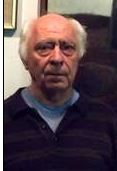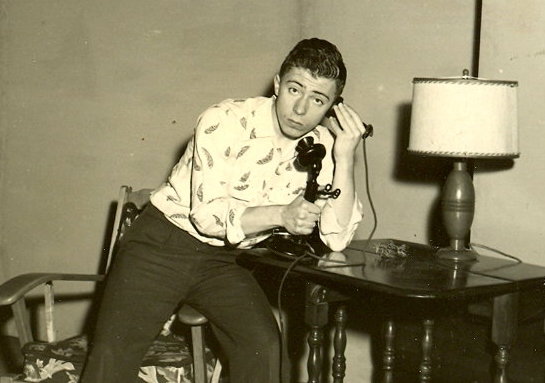**
**
X-TRA SERVICES
by Stephen Poleskie
“The photo above is of me talking on a telephone when telephones were for talking on, not typing out messages to one’s friends with your thumb, or playing games, or getting directions that get you lost anyway. We still use a land line in our house, although my wife and I both have cell phones; or mobiles as they are called in the rest of the world. We have the basic kind: small devices with big keys that are revealed when you flip open the lid. No iPhones loaded with apps for us. I rarely use my mobile. Who wants to answer a call when I am out taking a nice, quiet walk? My minutes carry over, so when I do dial a number a little voice warns me that I have only “nine months, three weeks, and thirty-six hours remaining for this call. . . .”
To change the subject — we will get back to telephones shortly — unlike my wife, who usually throws away the advertisements and solicitations she receives in the mail without opening them, except for fashion catalogs, I not only open mine, but also read almost every word. In fact, if my pile is especially thin, or if I might have seen something especially interesting in her stack, I have been known to go back into the wastebasket and reclaim things she has abandoned.
Advertising tells us a great deal about the world we live in. I believe that it defines our culture, especially for young people. While I personally wish that most advertising would go away, and do not let it influence my consumer choices, at least not consciously, I study it scrupulously.
When watching sports on television, especially football, I always turn off the commentary during the game, hitting the mute button to bring the sound back on when my vision catches sight of a commercial. And while I resist the currently popular buzz phrases, I have been known to enliven a conversation by injecting at the odd moment such old classics as: “At last, I have found my car,” and “Where’s the beef?” And the way advertising copy writers abuse the language; I certainly would not fly on an airline that can’t spell “value.” I was surprised that when they made their comeback from bankruptcy the offending airline did not call itself “Nuvalujet.”
One of the nice things about living in the country is that you can have windows in your rooms that look out on something besides your next door neighbor’s aluminum siding, and you don’t need to hang a curtain to spoil the view. This morning, while I was shaving, I happened to see a deer standing, nursing her spotted fawn. As I watched, an apparently orphaned fawn came out of the bushes and tried to nurse on one of the mother deer’s teats. Stamping her foot angrily, the mother drove the strange fawn away. Curious about this new creature, which I am sure it did not recognize as a mirror image of itself, the first fawn left its mother and went over to the one that had been driven away. They stood facing each other for a while, almost as if they were talking. Shortly, the two young deer began to scamper around, playing a kind of game. Tiring of this, or perhaps feeling hungry again, the first fawn came back to its mother and nuzzled it with his nose, looking in the direction of the other fawn. Then it began to nurse, and the orphaned fawn came over and took a teat; the mother did not drive it away. Looking up the hill now I see that the three deer, that had been waiting to cross the road, are gone from my upper field. I have not heard the squeal of brakes. I’ll get back to my mail.
I open my phone bill, which is always stuffed with advertisements; so much so that it is usually difficult to tell where the ads end and the actual bill begins. This time they have made it clearer. A large headline at the top of a page proclaims: X-tra Services. This page informs me that I need not fumble with my address book anymore. As I don’t have one I surely won’t. Nor will I waste time dialing long series of numbers overseas, although I have no friends overseas that I want to call. However, for a small additional monthly fee, I can have a service whereby I only need to speak the desired name into my telephone and some electronic robot will automatically dial the number for me. Fascinating!
I imagine calling my Uncle Joe in Cleveland by simply saying his name: “Get me Joe Zyharria.” “Hello, Joe’s Pizzeria. . . .” “Oh? Are you in Cleveland?” “Yeah. . . .” “I’m sorry; my automatic telephone must have dialed the wrong number.” “Sure it did asshole!” Click, hummmm. . . .
I am reminded of an article that I read several years ago about the millions of dollars spent by the Department of Defense to develop a “voice activated” firing system for its fighter jets. No more “thumb on the stick,” like in old WWII movies, the pilot grinning as he pours a hail of lead down on an airplane flown by one of his country’s enemies. Today’s sky warriors, sitting in air-conditioned comfort in front of a video-game-like panel, would need only speak the word “fire” to send a missile hot up the tailpipe of a hostile aircraft.
However, the DoD discovered that its pilots spoke in 27 distinctly different dialects. Therefore, the firing mechanism had to be programmed, at a considerable extra cost, to respond not only to “fire” as pronounced by the man on the six o’clock news, but also to “fyre,” and “firah,” and “fierr,” and “fighra,” and 23 other similar sounds, which I cannot even imagine. And this was before women became combat pilots, I wonder if these sound sensitive devices have now been programmed to take gentler voices. I am sure the total expenditure was well worth it. Think of all the wear and tear it saved on pilots’ thumbs. In a big blow-out like Iraq, considering the micro-second it would have taken to hit a button, the thumb wear savings must have totaled up to a least an hour and a half.
Still pondering the usefulness of the voice-activated dialing system that I am being offered by the telephone company, I come to the end of the page. I see a notation: Not available in all areas. Well that settles that. I doubt that I will be able to get such a technological miracle in the backward area where I live. We only recently got 911 calls.
The piece de resistance is “Caller ID.” A paragraph is dedicated to informing me how input from “smart customers,” which I assume does not mean me as I can’t recall anyone ever asking my opinion, has caused them to change the name of the service to better describe what it does. Henceforth, what was formerly known as “Call ID” will now be called “Caller ID.” Well, I am certainly glad they cleared that one up.
Wow! This is the service for me. For a small monthly fee I can have the number of the caller displayed on my telephone. This is great! No more picking up the telephone thinking that it’s my late aunt’s lawyer calling telling me I have inherited a tidy sum, when it’s really my bank calling to say I am overdrawn again.
A second wow! issues from my mouth, sounding even more incredulous than the first. The advertisement’s neat, bold-faced line tells me that, for another little, extra fee, I can have “Caller-ID with Name Service.” No need to flip through my phone book frantically trying to find out who the caller is before I answer the telephone. This service will also display the name of the incoming caller.
I am about to dial the toll-free number to order up these X-tra services, when the next item catches my eye, as it should any intelligent consumer. This makes me wonder why whoever concocted this advert didn’t bury this item a few pages on. For an additional extra fee I can have this X-tra service: Caller-ID Blocking. This option will automatically block my name and number from anyone’s Caller-ID. Thus, anyone using this service would be able to bypass my Caller-ID and sneak up on me. Their call would be anonymous. I wouldn’t be able to tell if it were the Jehovah’s Witnesses, or the bogus Police Retirement Fund calling, and not my late aunt’s lawyer.
Pitching the phone company’s advertisement into the trash, I decide not to get any of their X-tra services. As in war, or football, there is a defense for every offense, and for every technology there is an anti-technology. Victory, apparently, does not come to the strongest nor smartest, just to the one who holds out the longest.
*
About the Author
Stephen Poleskie is a writer and an artist. His writing; fiction, poetry and art criticism has appeared in journals in Australia, Czech Republic, Germany, India, Italy, Mexico, the Philippines, and the  UK, as well as in the USA, and in the anthologies The Book of Love, (W.W. Norton) and Being Human, and been nominated for a Pushcart Prize. He has published seven novels. His artworks are in the collections of numerous museums, including the MoMA, and the Metropolitan Museum, in New York, and the Tate Gallery, and Victoria and Albert Museum in London. Poleskie has taught or been a visiting artist at a number of schools, including: The School of Visual Arts, NYC, the University of California/Berkeley, MIT, Rhode Island School of Design, and Cornell University, and been a resident at the American Academy in Rome. Poleskie currently lives in Ithaca, NY, with his wife the author Jeanne Mackin.
UK, as well as in the USA, and in the anthologies The Book of Love, (W.W. Norton) and Being Human, and been nominated for a Pushcart Prize. He has published seven novels. His artworks are in the collections of numerous museums, including the MoMA, and the Metropolitan Museum, in New York, and the Tate Gallery, and Victoria and Albert Museum in London. Poleskie has taught or been a visiting artist at a number of schools, including: The School of Visual Arts, NYC, the University of California/Berkeley, MIT, Rhode Island School of Design, and Cornell University, and been a resident at the American Academy in Rome. Poleskie currently lives in Ithaca, NY, with his wife the author Jeanne Mackin.

Recent Comments